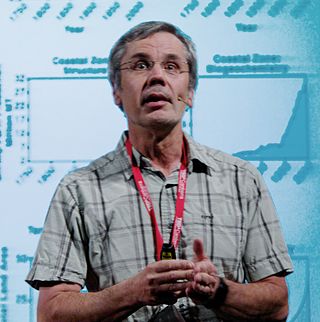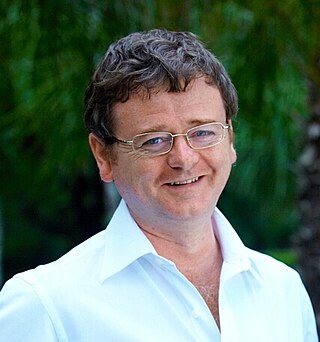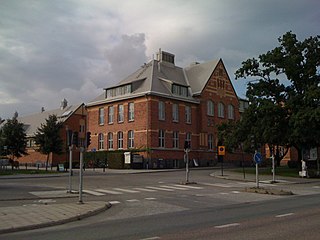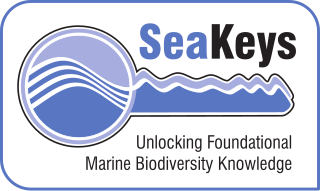Related Research Articles
Regime shifts are large, abrupt, persistent changes in the structure and function of ecosystems, the climate, financial systems or other complex systems. A regime is a characteristic behaviour of a system which is maintained by mutually reinforced processes or feedbacks. Regimes are considered persistent relative to the time period over which the shift occurs. The change of regimes, or the shift, usually occurs when a smooth change in an internal process (feedback) or a single disturbance triggers a completely different system behavior. Although such non-linear changes have been widely studied in different disciplines ranging from atoms to climate dynamics, regime shifts have gained importance in ecology because they can substantially affect the flow of ecosystem services that societies rely upon, such as provision of food, clean water or climate regulation. Moreover, regime shift occurrence is expected to increase as human influence on the planet increases – the Anthropocene – including current trends on human induced climate change and biodiversity loss. When regime shifts are associated with a critical or bifurcation point, they may also be referred to as critical transitions.

In ecology, resilience is the capacity of an ecosystem to respond to a perturbation or disturbance by resisting damage and subsequently recovering. Such perturbations and disturbances can include stochastic events such as fires, flooding, windstorms, insect population explosions, and human activities such as deforestation, fracking of the ground for oil extraction, pesticide sprayed in soil, and the introduction of exotic plant or animal species. Disturbances of sufficient magnitude or duration can profoundly affect an ecosystem and may force an ecosystem to reach a threshold beyond which a different regime of processes and structures predominates. When such thresholds are associated with a critical or bifurcation point, these regime shifts may also be referred to as critical transitions.
Brian Harrison Walker is a scientist specialized in ecological sustainability and resilience in socio-ecological systems.

Planetary boundaries are a framework to describe limits to the impacts of human activities on the Earth system. Beyond these limits, the environment may not be able to self-regulate anymore. This would mean the Earth system would leave the period of stability of the Holocene, in which human society developed. The framework is based on scientific evidence that human actions, especially those of industrialized societies since the Industrial Revolution, have become the main driver of global environmental change. According to the framework, "transgressing one or more planetary boundaries may be deleterious or even catastrophic due to the risk of crossing thresholds that will trigger non-linear, abrupt environmental change within continental-scale to planetary-scale systems."

Stephen Russell Carpenter is an American lake ecologist who focuses on lake eutrophication which is the over-enrichment of lake ecosystems leading to toxic blooms of micro-organisms and fish kills.

Anne Larigauderie is a French ecologist. She is currently the Executive Secretary of the Intergovernmental Platform on Biodiversity and Ecosystem Services (IPBES). She was previously the Head of Science in Society at ICSU, the International Council for Science, and the executive director of DIVERSITAS, the international scientific programme dedicated to biodiversity science, under the auspices of ICSU, and UNESCO.

William Lee Steffen was an American-born Australian chemist. He was the executive director of the Australian National University (ANU) Climate Change Institute and a member of the Australian Climate Commission until its dissolution in September 2013. From 1998 to 2004, he was the executive director of the International Geosphere-Biosphere Programme, a coordinating body of national environmental change organisations based in Stockholm. Steffen was one of the founding climate councillors of the Climate Council, with whom he frequently co-authored reports, and spoke in the media on issues relating to climate change and renewable energy.

Carl Folke, is a trans-disciplinary environmental scientist and a member of the Royal Swedish Academy of Sciences. He is a specialist in economics, resilience, and social-ecological systems, viewing such systems as intertwined and potentially unexpected in their interactions. As a framework for resource management, this perspective brings important insights to environmental management, urban planning, and climate adaptation. He suggests ways to improve our ability to understand complex social-ecological interactions, deal with change, and build resilience, often working at smaller scales as a step towards addressing larger scales.

Terence P. Hughes is a professor of marine biology at James Cook University in Queensland, Australia. He is known for research on the global coral bleaching event caused by climate change. Nature dubbed him "Reef sentinel" in 2016 for the global role he plays in applying multi-disciplinary science to securing reef sustainability. He is an Australian Research Council Laureate Fellow and Director of the Australian Research Council (ARC) Centre of Excellence for Coral Reef Studies. His research interests encompass coral reef ecology, macroecology and evolution, as well as social-ecological interactions. His recent work has focused on marine ecology, macroecology, climate change, identifying safe planetary boundaries for human development, and on transformative governance of the sea in Australia, Chile, China, the Galapagos Islands, Gulf of Maine and the Coral Triangle. His career citations in Google Scholar exceed 88,000.
The Cape Winelands Biosphere Reserve is located in the Western Cape Province of South Africa approximately 40 km (25 mi) east of Cape Town. The Biosphere Reserve extends from the Kogelberg Biosphere Reserve in the south, northwards along the Cape Fold Belt Mountain Chain and the adjoining valleys constituting the Cape Winelands. The Biosphere Reserve incorporates key portions of the registered Cape Floral Region Protected Areas World Heritage Site. The Reserve was designated in 2007.

Bettine van Vuuren is the Registrar and a Member of the Executive at the University of Johannesburg. She is also a Professor of Zoology and Director of the Centre for Ecological Genomics and Wildlife Conservation at the University of Johannesburg.

Justine Shaw is an Australian Antarctic researcher, best known for her conservation work on subantarctic islands, currently working at the Queensland University of Technology. She has a wide global research network, having worked in Australia, South Africa, sub-Antarctic/Antarctic and the Arctic.

The Stockholm Resilience Centre (SRC), is a research centre on resilience and sustainability science at Stockholm University. It is a joint initiative between Stockholm University and the Beijer Institute of Ecological Economics at the Royal Swedish Academy of Sciences.

Line Gordon is a Swedish sustainability scientist whose transdisciplinary research combines food, water, and the benefits people receive from nature. Gordon is the director of the Stockholm Resilience Centre and a professor at Stockholm University, Sweden. She is also on the board of the EAT foundation, and often participates in public discussions of food and climate in Sweden.

SeaKeys is a large collaborative marine biodiversity project funded through the Foundational Biodiversity Information Program in South Africa. The purpose of the project is to collect and distribute genetic, species and ecosystem information relating to marine biodiversity in southern Africa, which may be used to support informed decision-making about the marine environment.
Elena M. Bennett is an American ecosystem ecologist specializing in studying the interactions of ecosystem services on landscape. She is currently a Professor and the Canada Research Chair in Sustainability Science at McGill University. She was inducted to the Royal Society of Canada’s College of New Scholars, Artists, and Scientists in 2017. She was elected a member of the National Academy of Sciences in 2022 and became a Guggenheim Fellow in the same year.
Programme on Ecosystem Change and Society (PECS) is a core project of Future Earth. PECS is an international research network that aims to connect and integrate research on the stewardship of social–ecological systems, how these systems support human wellbeing.
Beatrice Crona is an ecologist, a professor at Stockholm University, and the Executive Director of the Program on Global Economic Dynamics and the Biosphere at the Royal Swedish Academy of Sciences. In 2023 she became a Science Director of the Stockholm Resilience Centre.
Maria Dornelas FRSE is a researcher in biodiversity and professor of biology based at St. Andrew's University. She was made a Fellow of the Royal Society of Edinburgh in 2021. Her research into biodiversity change has challenged previous views, on the growth and decline of coral reefs to understanding global biodiversity with data analysis on how species or ecosystems are changing in the Anthropocene.
Timon McPhearson is an American urban ecologist, researcher, academic and author. He is Professor of Urban Ecology at The New School and the founder and director of its Urban Systems Lab. McPhearson is known for his interdisciplinary research on the interacting social-ecological-technological processes that drive urban system dynamics and impact human well-being. He is a Research Fellow at the Cary Institute of Ecosystem Studies and Stockholm Resilience Centre. McPhearson received the 2023 Sustainability Science Award from the Ecological Society of America.
References
- 1 2 3 Pain, Elisabeth (10 September 2010). "Testing Mother Earth's Resilience". Science. doi:10.1126/science.caredit.a1000088.
- 1 2 Biggs, Reinette (14 December 2008). Uncertainty, learning and innovation in ecosystem management (PhD thesis). University of Wisconsin. Retrieved 14 December 2020.
- ↑ Scholes, R.J.; Biggs, R. (2005). "A biodiversity intactness index". Nature. 434 (7029): 45–49. Bibcode:2005Natur.434...45S. doi:10.1038/nature03289. PMID 15744293. S2CID 4313245.
- ↑ "Reinette (Oonsie) Biggs – Curriculum Vitae" (PDF). Centre for Complex Systems in Transition. Stellenbosch University. Retrieved 17 February 2021.
- ↑ "Branco Weiss Fellowship". Branco Weiss Fellowship. Retrieved 12 December 2020.
- ↑ "Regime Shift Database". Regime Shift Database. Retrieved 12 December 2020.
- ↑ "Who we are". Seeds of Good Anthropocenes. Retrieved 16 October 2019.
- ↑ "Scientific Committee". PECS Scientific Committee. Retrieved 12 December 2020.
- ↑ Reinette Biggs publications indexed by Google Scholar